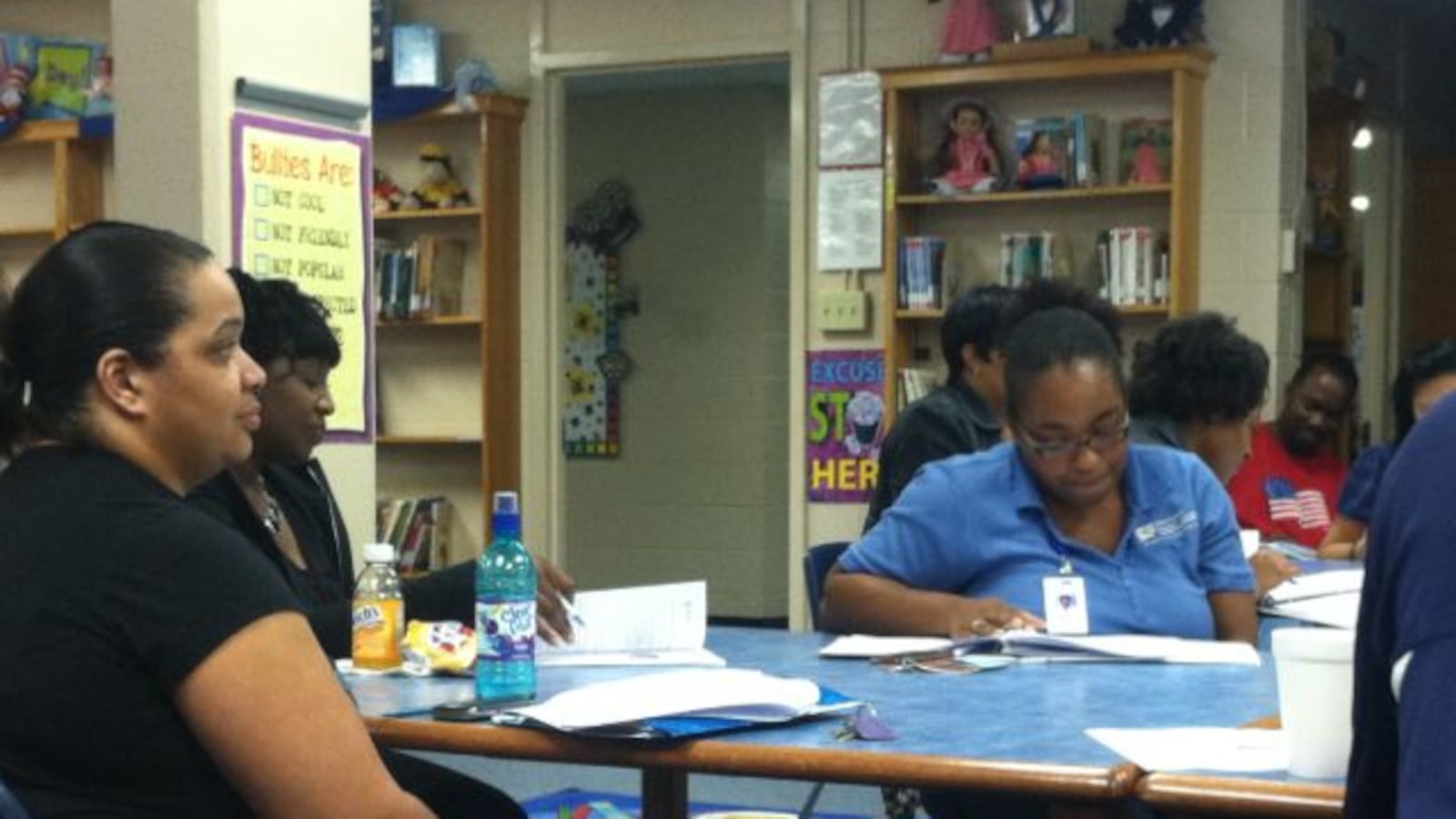Last Thursday, 14 parents gathered in a classroom at Douglass K-8 Optional School to mark their graduation from Stand UP, a course that focused on learning how to interact effectively with their child’s school and teachers, help children with their homework and understand their school’s test scores. They will be the last class of a group of more than 300 Memphis parents who participated in parent engagement trainings through Stand for Children since 2012.
Some 140 Memphis parents participated in Stand UP trainings this fall at six Memphis schools: Brownsville Road, Winridge Elementary, Cummings Elementary, Peabody Elementary, Kingsbury, and Douglass. The program was part of a four-city pilot run by Stand for Children, a national education advocacy group. Phoenix, Chicago, and Tacoma, Wash. also hosted Stand UP trainings.
Phyllis Whitney-Ousley, a parent of a 1st grader at Douglass who also teaches physical education in Shelby County Schools, said the program emphasized the importance of parents being engaged in school. “We can have a say in what happens in our child’s school,” she said.Stand UP began running parent trainings in the spring of 2012, said Ryan Tracy, a former family engagement trainer with Stand For Children, a national education advocacy group that started in Oregon. Overall, more than 350 Memphis parents participated and more than 200 graduated.
Tracy said the program came about partly because the group realized parents needed more baseline knowledge about what was happening in schools and what their role is. For instance, while the group advocates for education priorities like the adoption of the Common Core State Standards, which have been adopted by 45 states and the District of Columbia, many Memphis parents didn’t know exactly what the nationally-coordinated academic standards were.
“We have a lot of parents who don’t really know how to interact with the educational structure of a school in order to help their child, or even know where they are,” said Betty Anderson, the director of Stand for Children in Tennessee.
Participants and training leaders said the program met a need for Memphis-area parents.
Jennifer Coudriet, a 7th grade teacher who ran the parent trainings at Douglass K-8, said, “It’s really hard for parents to get the resources they need. Especially if they’re not education majors, they’re not teachers, it’s hard for them to know exactly how to read data, or how to help with certain subjects.”
At a training at Brownsville Road in September that focused on “Effective Parent-Teacher Communication,” one parent wondered how to instigate conversations with her child’s teacher when nothing is actually wrong in school and another offered advice. Later, two parents role-played a conversation between parent and teacher that began with a discussion about a football game – an example of starting off on a friendly foot.
Though Stand UP will not continue to exist in its current iteration, Stand for Children plans to continue to run parent-education sessions, said Anderson. She said the changes to the Stand UP program will come along with restructuring and other changes in Stand’s Memphis office. The organization is hiring a new city director, and its family engagement coordinators and organizers will see a shift in responsibilities, Anderson said.
Parents at a training at Brownsville Road earlier this fall finish a class by reciting the “Stand Up Pledge.”
New methods for teaching math were particularly concerning to the parents at Brownsville, who found that the way they had learned to divide was not the same as the methods their children were learning.
Also on the agenda: Is it appropriate to text your child’s teacher? (Opinions varied; the consensus was to abide by each person’s personal preference.)
Coudriet said her class discussed everything from how to incorporate math in everyday life to understanding the Common Core. Douglass’s principal came in and discussed how to interpret academic data.
Other sessions in the program’s curriculum included: Building Family-School Collaboration; Effective Parent-Child Communication; Empowering Parents as Leaders in Education; Building a Child’s Self-Esteem; Student Performance and Academic Standards; Understanding School and Student Data; Building Responsibility and Discipline; The Path to College: Dreams to Reality; and Getting Involved in Your School and Community.
Participant Whitney-Ousley said the program had been useful to her as a teacher and as a parent. “Usually when a parent is frustrated, it’s because they don’t understand,” she said. “It takes all three of us (parent, child, and teacher) working together.”
Whitney-Ousley said she planned to continue to be involved with Stand.
Anderson said that while the Stand UP model had been effective, the organization’s parent engagement programs will look different in the future. She said that the 8-to-10-week program was too long, and that the organization was likely to organize its trainings into modules. She said the long course might not be the most effective way of allocating the organization’s resources.
Stand for Children has pushed for state and local-level policy changes: It was involved in efforts to increase Memphis’ sales tax to fund more Pre-K and has advocated for the Common Core and changes to teacher licensure practices in Tennessee. Parents who participate in Stand UP do not have to become Stand members, though a majority in Memphis did, Tracy said.
Stand’s evolution from grassroots parent advocacy group to national organization has drawn some concern
Anderson said Stand for Children would continue to focus on engaging parents in Tennessee. “The voice that is so missed in the education reform debate is the parent,” she said.


